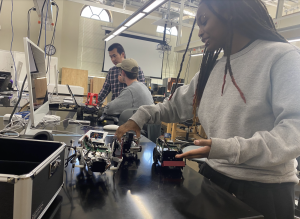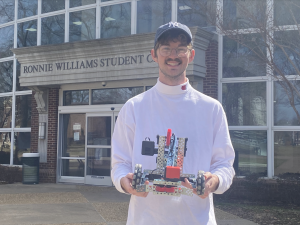Nah, As the engineering physics program in the College of Natural Sciences and Mathematics’ Department of Physics and Astronomy focuses on earning its accreditation from the Accreditation Board for Engineering and Technology, students are learning everyday to become more skilled in their crafts.
William Slaton, the program coordinator, says one reason the accreditation is a game-changer is that it will open an opportunity for graduates to take the professional engineering license exam.
Niya “Honey” Norfolk, a freshman from Little Rock, was in Nancy Getson’s Intro to Engineering class in fall 2022. She still spends time tinkering with her BOE-bots, which is short for Board of Education robots. The BOE-bot is about four inches wide and battery operated and consists of a main circuit board, a plug-in controller, wheels and an aluminum chassis.
“In the intro to engineering class, the students program the robots and there are some that have little putters on them,” Slaton says as he brings out a replica soccer field about four feet long. “They learn to program the bots to interact with the world – like play golf, soccer, things like that.”
Norfolk has programmed one of the BOE-bots to play the UCA Fight Song.
“I love playing with these. I bought one on my own.” she said.
Norfolk first became interested in building robots because she wanted to be a video game creator. She joined the robotics team at Forest Heights STEM academy.
“I was only there to program the robots to move, but started getting into more complicated things and decided I really liked it,” she said. “When I got to UCA, the community was so welcoming and I saw there were so many things to learn.”
Robotics students build on their skills each semester, until they’re able to build the machines from scratch. Slaton has a maze in the classroom for students to navigate their robots around the obstacles.
“By the time they’re seniors, they are working on techniques for the robot to know where it is in the field of play and how to adjust if it gets off track and work its way back to the goal,” Slaton said. “By that time, the robots are smart, and they’re able to adjust to the world.”
Austin Miller is on one of the senior design teams. He has stripped down a radio-controlled (RC) car and rebuilt it from scratch by installing a new battery pack, a miniature computer and a camera.
“As we record the data, it will basically record the throttle input and the steering input values as well. Once it has enough data, it will learn how to drive itself,” Miller said.
Miller and his team will use this RC car to compete in the National Robotics Challenge in Marion, Ohio, in April. The car will be used to navigate a course as quickly as possible.
“We’re trying to make sure we win first place this year,” Miller said.
Last year was the first year UCA students participated in the robotics competition. The two teams, Donkey Car and Robot Ninja, took home first and third place. Miller didn’t compete, but he was able to go because there was an extra spot.
 “I got to watch the whole competition and anticipate what downfalls we may have and difficulties we need to overcome,” Miller said. “We’ve made our robot 100% waterproof. It drove through a giant puddle two days ago and it’s still working just fine. There was a huge concern last year because of rain. We got lucky because it rained in between our turns, but this year we’re prepared.”
“I got to watch the whole competition and anticipate what downfalls we may have and difficulties we need to overcome,” Miller said. “We’ve made our robot 100% waterproof. It drove through a giant puddle two days ago and it’s still working just fine. There was a huge concern last year because of rain. We got lucky because it rained in between our turns, but this year we’re prepared.”
Harrison Bounds, a senior from Camden, became one of the founding members of UCA’s robotics club as a freshman, now he’s the president. His team, Flash Fire, will also be competing in the robotics challenge in April with an RC car.
“We just got it up and running,” Bounds said as he prepared to take the vehicle for more data collection in a nearby parking lot. “It takes about 20 to 30 pictures per second. Each of those pictures is related to a throttle value and steering value. When it sees one of those pictures, it relates to a picture it sees when it’s driving itself and then assigns its own throttle to a certain value.”
Students graduate from the engineering physics program with skills necessary to work in any field where automation is an important component, including modern manufacturing, transportation automation and modern warehouses. They are prepared for tackling complex challenges in science and technology. Slaton says they are expecting a decision from the accreditation board as soon as August 2023.



